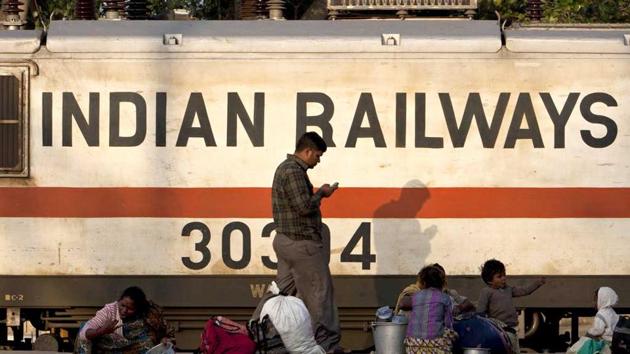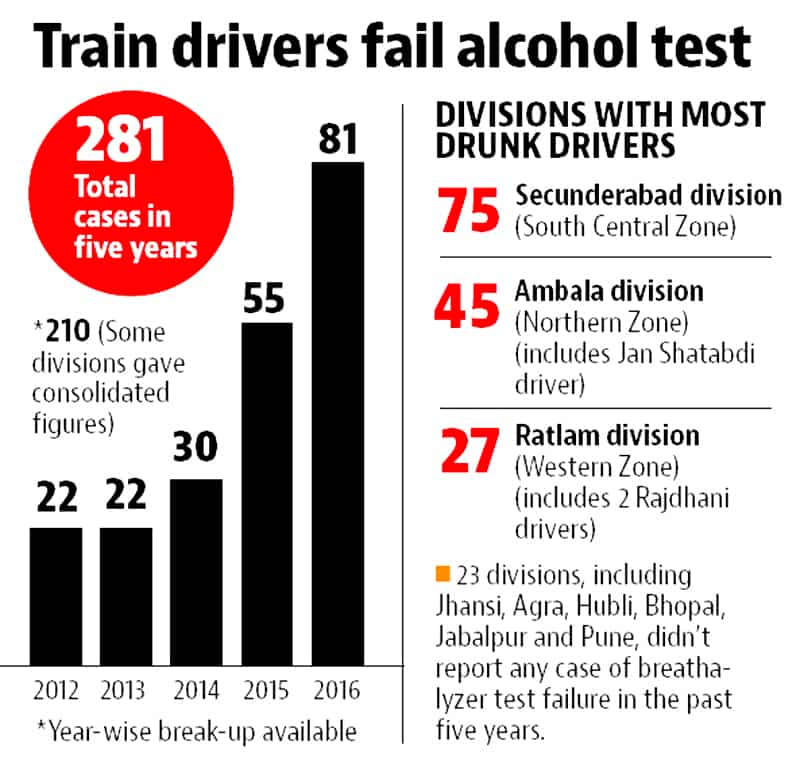Train drivers caught drunk, four-fold rise in alcohol test failure in railways
About 15% of loco-pilots failed alcohol test at the end of their journey, which means they probably risked the lives of hundreds of passengers.
Indian Railways has seen a near-fourfold rise in the number of train drivers who failed an alcohol test over the past five years, official figures show.

Most of these loco-pilots showed up for work drunk. But, in what experts say is a worrying trend, about 15% of them – at an annualized average – failed the alcohol test at the end of their journey, which means they probably risked the lives of hundreds of passengers.
And the problem seems to be getting worse.
In 2015 and 2016, the annual spike in such cases was more than 50%, according to information obtained by Hindustan Times under the Right to Information from 50 of India’s 70 railway divisions. These included passenger (long distance and suburban) and goods train drivers.

Twenty railway divisions did not respond to HT’s request for information on the number of loco-pilots who failed the breathalyser test.
A Northern railway spokesperson told HT “the numbers are on a rise since the railway has become more stringent.”
There is no evidence to link such a trend with train accidents, though most people agree rising alcoholism among loco-pilots is a cause for concern.
“Every day we run nearly 15,000 operations. In comparison, the rate of failure of breathalyser test is negligible,” said a senior official from the Railway Board.
“However, I agree that one train carries 1000 to 1200 people, so even one train accident can cause a disaster.”
Railway rules say every loco pilot must undergo a breathalyzer test while signing on and signing off duty. Failing a test can lead to removal from service, though most offenders are let off with temporary removal from rosters or denial of increments.
HT spoke to more than a dozen loco-pilots, former high-ranking railway officials and doctors who blamed increasing stress levels for a rise in the number of drunken train drivers.
“In summer, the temperature inside the loco cabins (engines) rises to above 50 degree celsius as none of the trains have AC loco cabins,” said a long distance train driver on the condition of anonymity for fear of official reprisal.
“We don’t get good sleep in railway retiring rooms as most of them are close to stations. Pay scale is highly unsatisfactory. In case of any incident, everyone finds faults with the driver. All these result in huge pressure,” said another driver of an inter-state train.
Psychologists don’t see the claim of stress as incredible. They say alcohol consumption due to stress has been on the rise in the country over the past 10 to 15 years, and that train drivers can’t remain isolated from this fact.
“Alcohol is being used across the board in the society to relieve from the stress because the traditional stress-busting mechanism is not available now. That’s why liquor sale is up 10 to 15 times in the last ten years,” said Sujata Sharma, a clinical psychologist.
Staff crunch also adds to work pressure. Railway sources said up to 40% shortages exist at all levels of loco-pilots in every zone. In the Delhi division, the sanctioned strength of passenger train loco-pilots is 203 but 40% of the posts are vacant.
“We drink occasionally and only when for another 8 to 10 hours we don’t have to attend any duty,” said a driver of a goods train.





